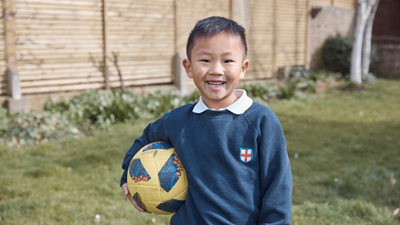When is it legal for a child to leave home?
There are lots of reasons a young person might want to leave home. They might want to live with a partner or friends, have their own child to care for or feel unsafe.
In some cases, parents may ask their children to leave home once they reach 16 – sometimes because they don't feel able to support them financially or because of a breakdown in relationships.
We've got advice about when it's legal for a child or young person to move out and what support is available when they do.
Ages children can move out
Parents are responsible for keeping their children safe until they reach 18 – and this includes making sure they have somewhere to live.
If a child or young person is harmed or at risk, it’s possible parents could be fined or even prosecuted for neglect. You can read about parental responsibility in more detail on Gov.UK.
If there's been a breakdown in relationships at home, Children’s Services might be able to help. Read more about the support available.
Once a young person reaches 16 they can leave home or their parents can ask them to move out. However, parents are responsible for their children’s wellbeing until they turn 18 – and they'll likely need support. You can read about parental responsibility in more detail on GOV.UK.
Sometimes a young person may leave home because they feel unsafe or have been forced to leave. Children’s services should help house anyone under 18 who can’t live at home. Read more about support available for homeless young people.
Contacting Children's Services
Your local authority can provide help for children in need. If there's been a breakdown in relationships, they can help find a mediator so a child can stay at home.
If you’re worried about supporting your child, you might be able to get short-term financial help from a local hardship fund or welfare assistance scheme.
But if it’s in the young person’s best interests to live somewhere else, local Children’s Services can help arrange for them to live with another family member or friend, or provide emergency accommodation such as a foster placement.
In Northern Ireland, Children’s Service might be referred to as Social Services. Read more about local authority services for children in need and how to get help on The Citizen’s Advice Bureau.
What support is available for young people leaving home?
However you might be feeling about your child moving out, it's important to make sure they know they can contact you if they feel unsafe or unwell. And that they know where they can access support away from home.
Parents of children under 16 are responsible for making sure their child has somewhere safe to stay. However, if a young person under 16 feels unsafe, or is made to leave home, local Children’s Services may be able to help.
Leaving home for under 16 year olds can be very difficult. Young people can:
- contact Childline on the phone or online to talk to a trained counsellor at any time, or can use Childline’s message boards to talk to other young people going through similar things.
- text the Young Minds Crisis Messenger for free 24/7 support across the UK if they’re experiencing a mental health crisis on 85258.
Before making the decision to move out, it’s important to think about some of the challenges young people can face.
- Moving out is expensive. Young people may not be able to put down a deposit on a property, pay rent and bills, or buy food, without some support.
- Young people will need help renting a property. In England, Northern Ireland and Wales, under 18s need a guarantor to rent. In Scotland, the regulations are different – but young people may still need support
- Young people aged 16 and over may be eligible to claim benefits in certain circumstances. Shelter provides information about the help available if you’re a 16 or 17 year old with nowhere to stay.
However, although a young person can choose to leave home once they turn 16, their parents are still legally responsible for them until they reach 18.
Young people who are 16 or 17 years old are homeless if:
- they leave home because they feel unsafe there
- they are forced to leave by a parent and have no other living arrangements.
A homeless young person is entitled to accommodation regardless of their nationality or immigration status. If you're concerned about a young person that might be homeless, contact our Helpline immediately.
Shelter provide information and advice for adults and young people on their housing rights in England, Wales, and Scotland. Housing Advice NI has information about Northern Ireland.
Your local Citizen’s Advice Bureau can help work out what support you are entitled to, and young people can call Childline to talk through their options. Childline also has more information on homelessness for young people.
Living away from home at university or college can be a challenging time for many young people. Students may not be used to taking care of themselves, and may feel isolated, homesick, and like they aren’t fitting in.
If you’re concerned about a young person, try:
- Listening to the young person’s concerns and trying to think of solutions together.
- Asking if they are getting enough food and sleep, and what their routine is like. They can try new activities and clubs to meet new people in the same situation.
- Encouraging them to share how they are feeling with support services at the college or university.
- Encouraging them to talk to their GP – they can find a local GP if they haven’t registered on the NHS website.
If you are worried about a young person at college or university, these resources might help:
- The NHS provides information on getting student medical care, self-help leaflets, and apps that might help.
- Expert Self Care’s Student Health App has information about mental and physical wellbeing for students.
- Student Minds is the UK’s student mental health charity and has plenty of helpful resources. Read their Transitions Leaflet for information about settling in and getting started.
- Any student under 19 can contact Childline 24/hours a day to speak to a trained counselor about how they are feeling, or can use Childline’s message boards to talk to other young people going through similar things. If you’re over 19, Childline links other organizations that provide support – such as The Mix.
When children in care reach the age of 16, they can start taking steps to prepare to be independent.
Local authorities will help children in care develop a pathway plan, and will explain the support available to them when they have left care.
Once they reach 18, the young people are no longer in care but can continue to be supported by the local authority until they’re 21, or for longer if they are in education or training. Some young people may stay on with foster carers.
In England, Wales and Northern Ireland, children leaving care are also legally entitled to a personal adviser. More information on leaving care can be found on GOV.UK.
Worried about a child?
Contact our helpline for free to talk to a trained professional – even if it's only to put your mind at ease.
Call us on 0808 800 5000, email [email protected] or fill in our online form.
Coping with your child moving out
When children move out, it can be hard to adjust. Parents can feel a range of emotions – from pride and happiness to sadness and guilt. It's also possible that you don't react immediately and feel worse as time goes on.
Empty Nest Syndrome is common and you're not alone. Family Lives have a dedicated helpline to support parents and advice about how to cope with your child moving out.
Keeping children safe after they leave home
Before your child moves out, it’s a good idea to talk about potential harms and how to navigate them without your support. This can range from sex, online safety, drugs and alcohol, and bullying.
Discuss checking in and staying in contact with your child. Every young person is different and will need a different level of contact once they have left home. Agree something that you both feel comfortable with.
If you're worried about a young person, the following places might be able to offer them some support:
- GPs will be able to provide advice and refer a young person to specialist support – they can find a local GP on the NHS website.
- Universities and colleges provide medical support, pastoral care and counselling for young people, find out more on their website or by asking staff.
- Most apprenticeships and jobs will also provide support through an Employee Assistance Programme. Make sure your child knows where they can find help if they need it.
- Childline provides a free helpline and online chat for children and young people up to the age of 19 – and link useful resources and helplines for anyone over 19. If someone older gets in touch, they can direct them to the right support service for them.
Keep an eye out for any of the below if you’re concerned about a young person.
- Feeling isolated and like they don’t fit in anywhere.
- A lack of energy and feeling tired.
- Feeling restless or agitated.
- Feeling reluctant to engage with other people or activities.
- Not wanting to do things they usually enjoy.
- Using alcohol or drugs to cope with feelings.
- Finding it hard to cope with everyday things.
Young Minds has a detailed guide to different mental health conditions for parents or carers.





